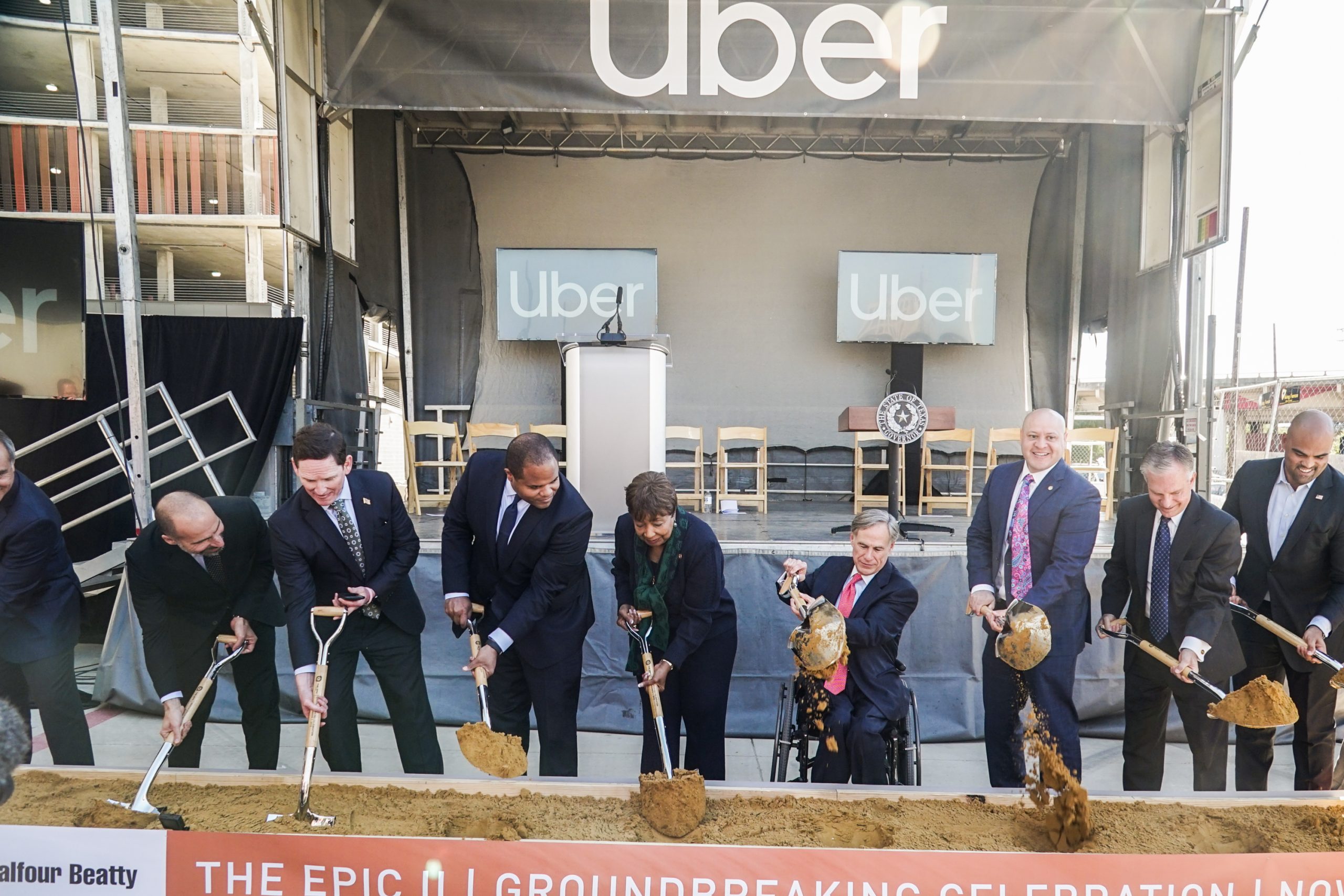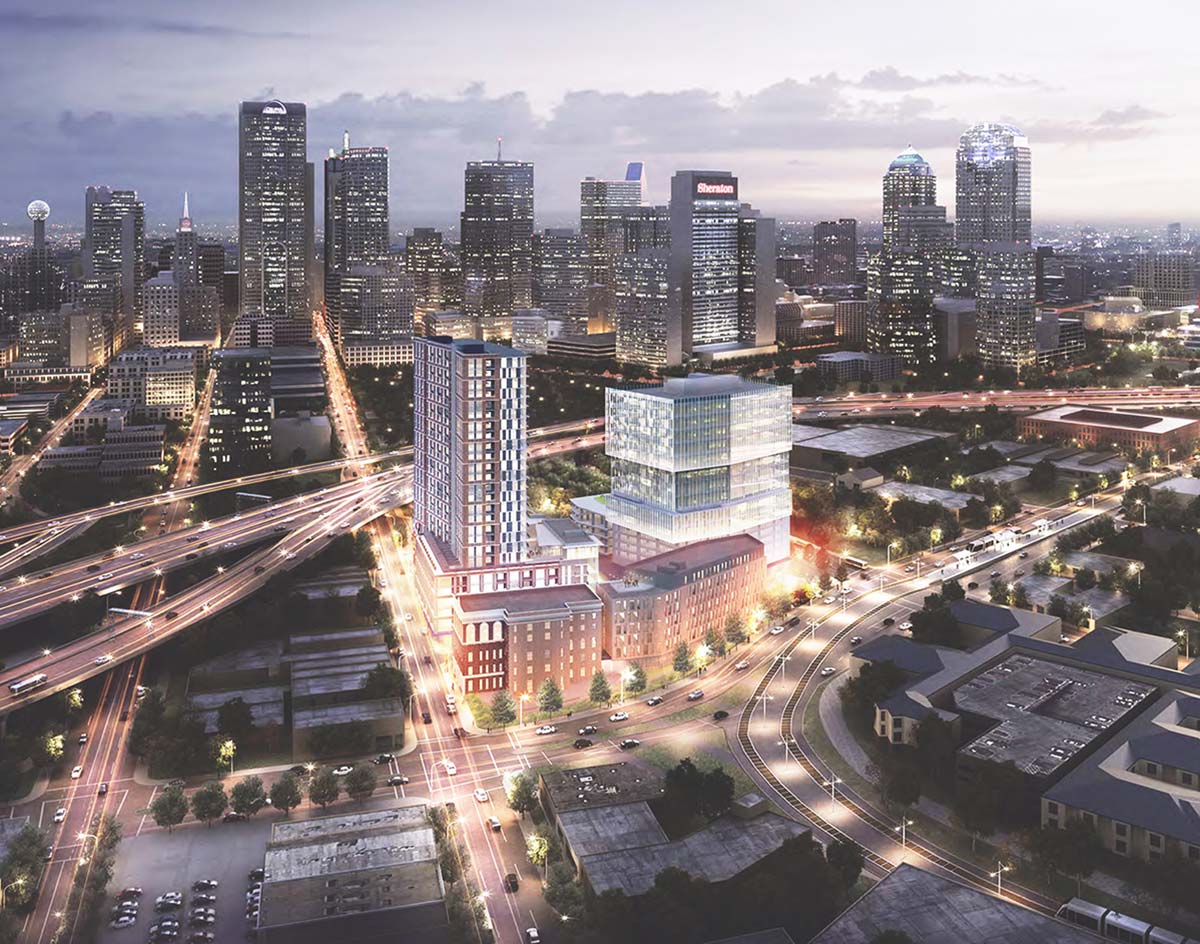After Already Getting A Two-Year Extension On Its Tax-Break Obligations, Uber Places 25 Percent Of Its Planned Deep Ellum Hub Up For Sublease.
Is the great Tech Ellum experiment already dying on the vine?
On Monday, Bisnow broke the news that “tech” giant Uber has placed 117,000 square feet of its new Deep Ellum office space onto the market for sublease. That amounts to 25 percent of the 470,000 total square feet of space within the new The Epic complex that the ride-sharing company had signed a 10-year agreement on — to much hullabaloo! — in August 2019.
Uber’s to-be-sublet space comes within the first-built of four total towers eventually planned for The Epic. While the company maintains its intentions to fully occupy The Epic’s the still-in-construction fourth tower as initially agreed upon, Monday’s reveal would further indicate that the company’s plans of employing 3,000 workers within its new Dallas complex by 2023 is now off the table.
This writing has been on the wall for some time.
The San Francisco-based company was lured to open a second national hub here in Dallas with nearly $36 million in economic incentives from the city, county and state governments. In exchange, the company promised to bring 3,000 new jobs to its new office by 2023 — and at an average employee salary of $100,000 per year. Officials roundly celebrated the announcement at the time.

In November 2019, local officials excitedly “break ground” on The Epic as part of Uber’s formal announcement of its plans to move in. (Photo by Manuel Frayre.)
In May, however, the company pointed to the economic fallout of the ongoing coronavirus pandemic while asking for and receiving a two-year extension from Dallas City Council on fulfilling the obligations that stand to net it $9.4 million in breaks from the City of Dallas itself. Per the Dallas Morning News report on that agreed-upon delay, the company’s new hiring obligations also dropped from 3,000 hires to 2,500 at that point.
As of May, Uber was only employing 200 employees at its Deep Ellum offices.
Even before announcing its Dallas move last year, critics questioned the long-term viability of the historically problematic company’s plans. In the days leading up to the announcement of its takeover of The Epic last year, Uber revealed that it had lost $5 billion in its previous three months of operations. Meanwhile, in May of this year, the company responded to the pandemic by cutting nearly one-quarter of its entire workforce — amounting to almost 7,000 jobs — while shuttering 45 of its global offices. Not surprisingly, pundits are still uncertain of what Uber’s future might look like post-pandemic.
Uber, it’s worth noting, does not appear to be the only one of The Epic’s anchor tenants that’s in trouble at the moment. As Monday’s Bisnow piece notes, the parent company of the co-working firm Spaces has placed some of its affiliated businesses into Chapter 11 bankruptcy in August. Spaces currently occupies some of the offices in the same first The Epic tower in which Uber is currently operating.
Since majority Deep Ellum property owner Westdale Asset Management first announced plans to erect The Epic on its mostly vacant lot at the northwest intersection of Elm Street and the Good-Latimer Expressway in 2015, the development’s potential impact on Deep Ellum has been a point of constant consternation. Beyond a welcome update to the historically significant building at the center of the project, the benefits of its other additions to the neighborhood have been openly questioned.
Though obviously inhibited by the coronavirus pandemic, The Epic’s effects on Deep Ellum can only generously be deemed as mild to date. After signing its first tenant in February, The Epic’s residential tower The Hamilton — boasting 310 units that range from a 498-square-foot studio at $1,650 per month and at 1,732-square-foot three-bedroom and -bath unit going for $6,040 per month — had only reached 23 percent occupancy as of July.
The Epic appears to have had its best luck in securing dining and entertainment tenants for its mixed-used space. In November, the Biscuit Bar became the development’s first dining option. More recently, Chef Graham Dodds’ new Good & Elm restaurant has opened its doors on the first floor of the complex’s planned Pittman Hotel building. A Miami-based nightlife concept and a new spot from the people behind Deep Ellum hotspots Stirr and Vidorra are also still reported en route.
Meanwhile, as construction still continues on The Epic’s fourth tower, activity appears to have stalled some at Westdale’s six-building Good E Project development right across Elm Street as the pandemic has stretched on.
So much for tech bros putting a wrench in Deep Ellum’s traditional 30-year boom-bust cycles, then? Tough to say just yet.
But the more things change in Deep Ellum, the more they definitely remain the same.

